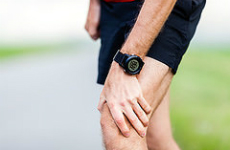Recovery and Rehab After Knee Replacement Surgery
- Details
- Published on Wednesday, 05 August 2015 13:16
 The rehabilitation and recovery process for getting you back on your feet and resuming an active lifestyle plays an important role after knee replacement surgery. It will help to improve your long-term success and aid you in healing more quickly from surgery. Committing to a regular plan and pushing yourself to stay as active as you can each day is essential.
The rehabilitation and recovery process for getting you back on your feet and resuming an active lifestyle plays an important role after knee replacement surgery. It will help to improve your long-term success and aid you in healing more quickly from surgery. Committing to a regular plan and pushing yourself to stay as active as you can each day is essential.
Each person's results will be different as well as their course of rehabilitation. However, with the help of rehab specialists in Bristol County, you stand a better chance of full recovery. Below are some areas to focus on to help to speed up your recovery.
Get Moving
The rehabilitation process begins right after you wake from surgery. Typically, you should be standing and walking within 24 hours of surgery with the help of a physical therapist and using some type of assistive device. In fact, it's essential that you begin using your artificial knee right away.
Physical Therapy
This type of treatment is crucial to your recovery, especially during your first 6 weeks. This therapy improves knee motion and enables you to transition back naturally to a more regular knee movement while doing activities. Patients who do therapy exercises as instructed usually recover faster.
Keep Checking for Signs of Infection or Blood Clots
The signs of infection include:
- Persistent fever of 100 degrees or higher
- Chills and shaking
- Increased swelling, tenderness or redness of your wound
- Wound drainage
- Increased pain during rest and activity
The signs of a blood clot include:
- Leg or calf pain not related to the incision
- Redness or tenderness above or below the knee
- Increased calf, foot or ankle swelling
Diet
You should be on a normal diet once home from the hospital. Your doctor might put you on a vitamin and iron supplement. He might also recommend that you avoid taking supplements that contain Vitamin K or eating foods with the vitamin in them if you're on certain blood thinning medications like warfarin. Foods that contain a lot of Vitamin K include cauliflower, broccoli, lettuce, onions, cabbage, turnip greens, kale, soybean oil, soybeans, lentils and spinach, to name some. You should drink lots of fluids, but limit your caffeine intake. Avoid alcohol altogether.
Keep the Weight Off
Your chances of a successful recovery increase by keeping extra weight off. Complication rates after surgery increase in obese people. Blood clots, infections, and pneumonia are more likely to happen to obese people versus people with normal body weight. Some surgeons even refuse to perform surgery on obese individuals because of these risks, unless they lose weight prior to the surgery.
By obtaining assistance at places like outpatient therapy in Fall River, Massachusetts, your knee replacement recovery process can go more smoothly, quickly, and comfortably. While you will get stronger and realize more motion with each passing day, it could take about a year or a little longer for full recovery.
You can view the rehab services (and others!) that Fall River Jewish Home provides by going to our Services page. If you have any questions, feel free to call us at 508.679.6172.
Have you had a knee replacement? What were some things that helped with your recovery?

